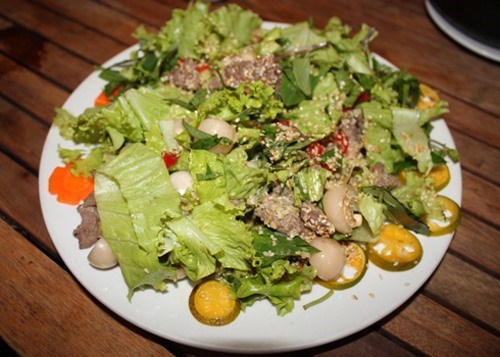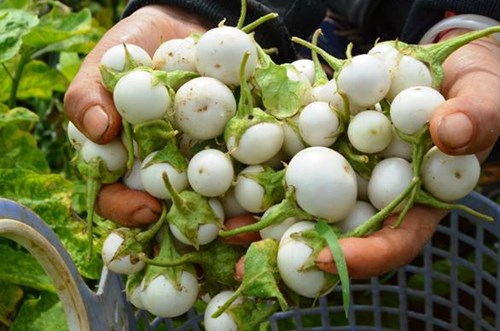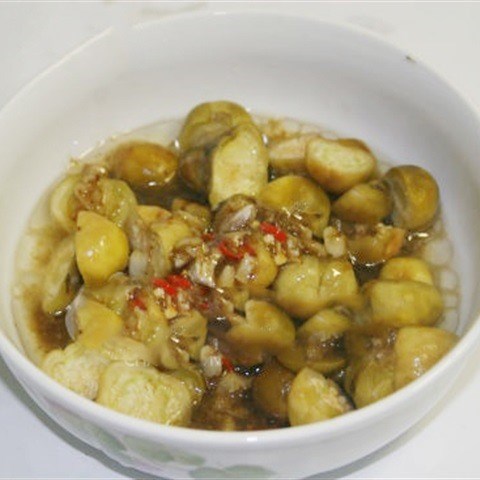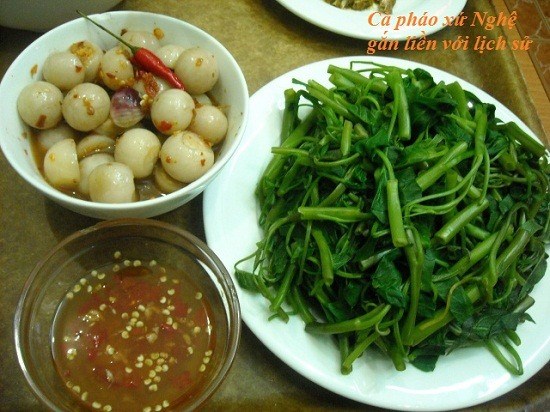
Robust dish: A plate of fried cà pháo and beef.
A
great example of this is the salted cà
pháo (white, round eggplant), which makes a meal much more enjoyable for
many people.
Apart
from pickled eggplant, there are many dishes made with the vegetable, like
salad cà pháo, fried cà pháo with beef, cà pháo brine with soya sauce and even some cà pháo medicine.
Phan
Thị Nguyệt, 65, a native of the central province of Nghệ An, is admired and
respected by locals for making the tastiest salted eggplant in the region.

Raw: Fresh cà pháo. Photos Thoimoi.vn
The
secret is how to retain the white colour and crispiness of the cà pháo and its crispy after being
salted, said Nguyệt.
“I
have to choose fresh and white vegetables and then dry them under a light sun
for four hours before soaking them in warm salt water in a clay jar, and
covering them with a round bamboo lattice. On this I place stones to press the
lattice down, to prevent the pickled eggplants from turning brown, and to keep
it crispy,” said Nguyệt. The jar has to be kept at a clean and cool place for
5-7 days before the pickle can be consumed.
Nguyệt
said she uses much more salt than usual to ferment the cà pháo and preserve it for a longer time.
She
recalled that when the country was very poor during the wars and its aftermath,
salted cà pháo was the main daily
food all year round for both civilians and soldiers, particularly in the
central province.
She
narrated a story: A young beautiful local girl had been captured by the French
commanding officer of a post and forced to become his wife so that he could
have a plate of pickled eggplants on his meal tray, everyday.
He
found it so tasty that he stopped eating western dishes. He also became so
addicted to the dish that once, when he was on duty far away from, he ordered
his troops to find salted cà pháo
from local villagers, Nguyệt said.

Everyday favourite: Pickled eggplant is something Vietnamese never tire of.
Herbalist
Hoàng Duy Tân of the National Hospital of Traditional Medicine said the dish
can be used as a medicine to treat hemolytic anemia, inflammation, tuberculosis
and other conditions. It can also be used as a diuretic or laxative, he said.
Cà pháo is particularly effectively in
treating blood-tinged stool, urinary problems, toothache, gingivitis and
chronic cough, he added.
Tân
told Việt Nam News that apart from the pickled eggplants, his mother often buys
cà bát (similar but bigger, green
with white stripes), slices and dips them in shrimp paste. The food is eaten
with perilla leaves and elsholtzia, commonly known as Vietnamese balm, or kinh giới.
“We
love its crispiness and saltiness, and the flavour of mắm tôm (fermented shrimp paste), but mother always said we should
not have too much of it, because it can cause stomach pain,” Tân said.

Winning combination: A tray of salted cà pháo and steamed morning glory is among the most favourite dishes in Việt Nam.
Many
villagers in his native place cut the cà
bát and steam it in the rice cooker. When it is well done, they mix it with
several condiments and spices. This helps retain the original flavor of the cà bát, but makes it more tasty and does
not cause any ill effects, Tân added.
He
said the Japanese also eat fresh cà bát,
but they cut into pieces and marinate them in salt for three hours before
mixing it with spices. They believe the dish helps remove toxins from the
blood.
However,
he warned that those with “cold blood” should be careful when eating cà pháo or cà bát. If such a person craves it, he/she should eat them with
garlic and chilli, he said. This dish is not good for sick or weak patients,
including those suffering from glaucoma, and they should avoid it, he stressed.
However,
pickled eggplant has been a part of Vietnamese cuisine for hundreds of years,
and miss it a lot when they are out of the country. A folk song sums this up
perfectly: Anh đi anh nhớ quê nhà, nhớ
canh rau muống nhớ cà dầm tương (You went far away from your home, you miss
the morning glory soup and pickled eggplants soaked in soya sauce).
By VNS